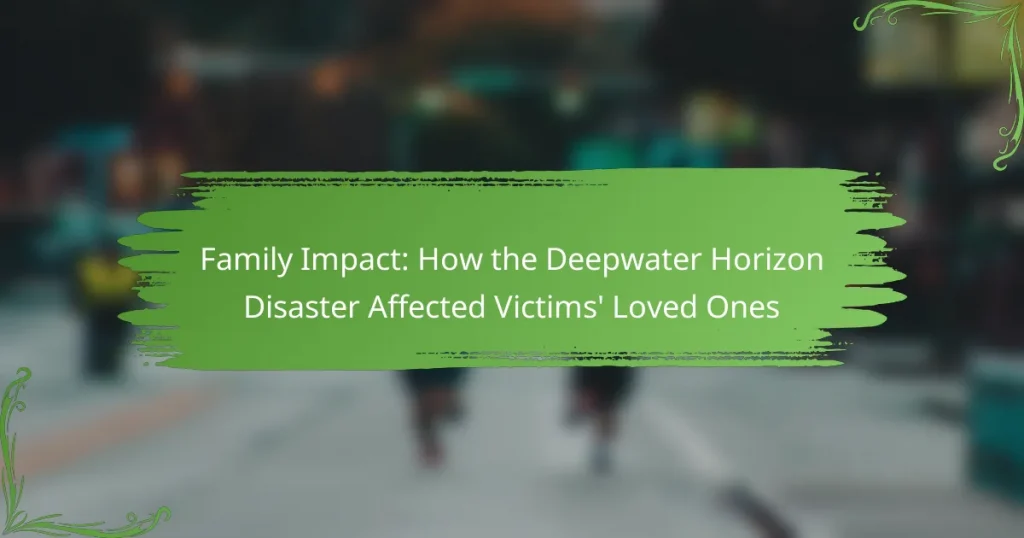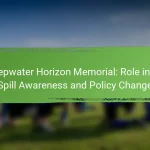The Deepwater Horizon disaster had profound impacts on affected families, manifesting in emotional, financial, and health-related challenges. Families faced significant emotional distress from job losses in the fishing and tourism industries, leading to financial instability and increased medical expenses due to health issues linked to toxic exposure. The disaster disrupted community ties, resulting in social isolation and heightened rates of anxiety and depression among family members. Long-term recovery efforts must address the holistic needs of families, emphasizing the importance of community resilience and access to mental health resources in the aftermath of such disasters.
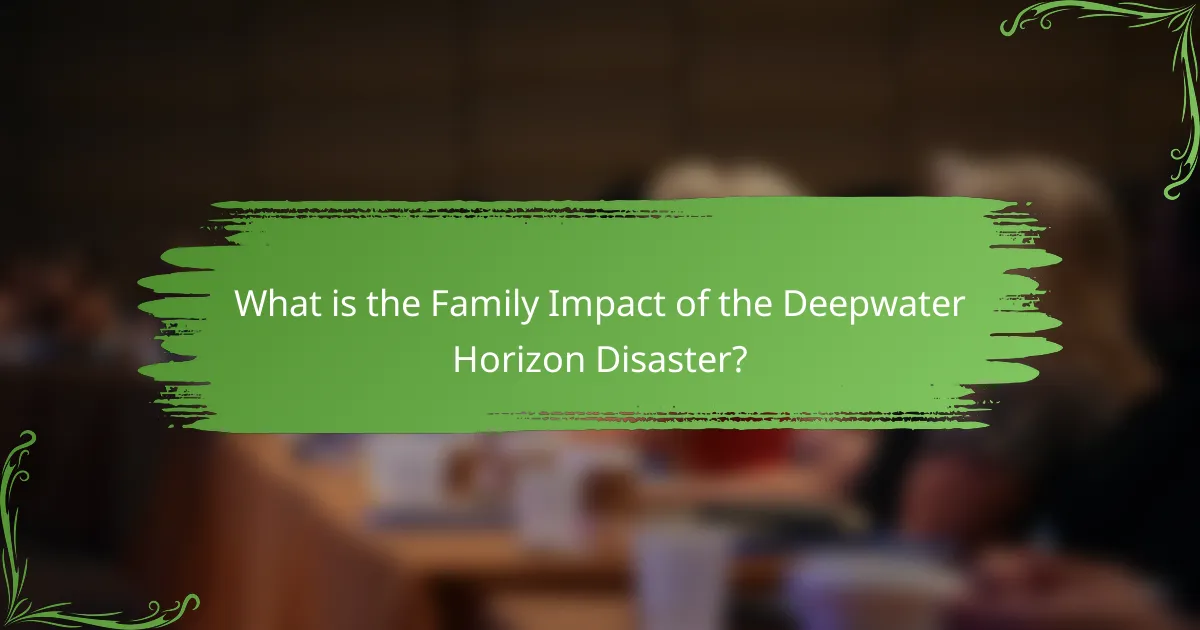
What is the Family Impact of the Deepwater Horizon Disaster?
The family impact of the Deepwater Horizon disaster includes emotional, financial, and health-related consequences for affected families. Many families experienced significant emotional distress due to the loss of livelihood and environmental degradation. The disaster led to job losses in fishing and tourism, creating financial instability for many households. Health issues arose from exposure to toxic substances, affecting family members physically and mentally. Research indicates that communities near the disaster site reported increased rates of anxiety and depression. The long-term implications include ongoing economic challenges and mental health struggles for families.
How did the Deepwater Horizon Disaster affect the families of the victims?
The Deepwater Horizon Disaster significantly impacted the families of the victims. The explosion resulted in the loss of 11 workers’ lives. Families faced emotional trauma and grief due to sudden loss. Financial hardships arose as many families lost their primary earners. Legal battles for compensation added to their stress. Support networks were strained as families tried to cope. The disaster also highlighted the need for better safety regulations in the oil industry. Overall, the tragedy reshaped the lives of the victims’ families profoundly and enduringly.
What emotional challenges did families face after the disaster?
Families faced numerous emotional challenges after the disaster. These challenges included grief over loss of loved ones and uncertainty about the future. Many families experienced heightened anxiety and stress due to the disaster’s aftermath. Feelings of helplessness and anger were also common among affected families. Additionally, the strain on family dynamics often led to conflicts and communication breakdowns. Studies show that post-disaster trauma can result in long-term psychological effects, including depression. The Deepwater Horizon disaster specifically led to increased mental health issues among families, as reported by mental health professionals.
How did the disaster impact the financial stability of victims’ families?
The disaster significantly affected the financial stability of victims’ families. Many families lost their primary earners due to fatalities or long-term injuries. The unemployment rate in the affected areas increased sharply following the disaster. Families faced mounting medical bills and funeral costs, straining their finances. Additionally, businesses that relied on the local economy suffered losses, leading to further job cuts. Financial aid and compensation from BP were often delayed or insufficient. Studies indicated that many families experienced increased debt and reduced quality of life. The cumulative effect of these factors led to long-term financial instability for many victims’ families.
What are the long-term effects on the families of victims?
Families of victims experience profound long-term effects, including psychological trauma and financial instability. Many suffer from ongoing grief and depression, which can lead to mental health disorders. Studies show that families may face increased anxiety and post-traumatic stress symptoms over time. Financially, the loss of a primary breadwinner can lead to significant economic hardship. This often results in a decline in living standards and increased reliance on social services. Additionally, families may experience social isolation due to stigma or lack of understanding from their communities. Research indicates that these long-term effects can persist for years, impacting family dynamics and overall quality of life.
How does the grief from the disaster manifest over time for families?
Grief from the disaster manifests over time for families through emotional, psychological, and social changes. Initially, families may experience shock and denial immediately following the disaster. As time progresses, feelings of anger and guilt often emerge. These emotions can lead to prolonged sadness and depression. Many families face difficulties in communication and relationships due to unresolved grief.
Over time, some families may develop coping mechanisms, while others struggle with ongoing trauma. Research indicates that grief can resurface during anniversaries or reminders of the disaster. A study by the American Psychological Association highlights that prolonged grief disorder affects a significant percentage of families impacted by disasters. This illustrates the long-term effects of grief on family dynamics and individual well-being.
What support systems are available to help families cope with loss?
Support systems available to help families cope with loss include grief counseling, support groups, and community resources. Grief counseling provides professional guidance to navigate emotions and loss. Support groups offer a space for shared experiences and mutual understanding among those affected. Community resources may include local organizations that provide assistance and information. According to the American Psychological Association, these systems can significantly aid in the healing process. They help families feel less isolated and provide coping strategies during difficult times.
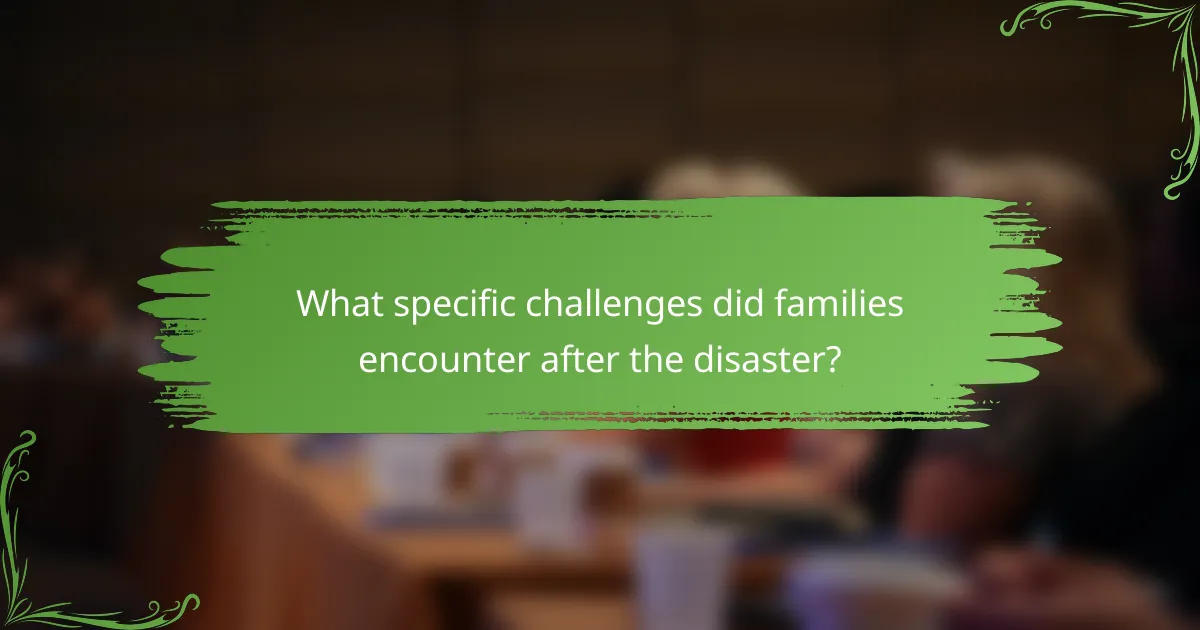
What specific challenges did families encounter after the disaster?
Families encountered significant emotional, financial, and logistical challenges after the disaster. Emotional distress included grief and anxiety due to loss of loved ones and livelihoods. Financial difficulties arose from job losses in the fishing and tourism industries. Many families faced increased medical expenses related to health issues caused by the disaster. Logistical challenges included displacement from homes and difficulties accessing clean water and food. Children in these families experienced disruptions in education and stability. Community support systems were strained, limiting resources for affected families. These challenges compounded over time, leading to long-term impacts on family dynamics and well-being.
How did the media coverage influence families’ experiences?
Media coverage significantly influenced families’ experiences during the Deepwater Horizon disaster. It shaped public perception and awareness of the event. Families often felt a mix of support and scrutiny due to media attention. Coverage highlighted their struggles, creating a sense of solidarity among affected families. However, it also exposed them to unwanted public attention and pressure. Reports on health impacts and economic consequences affected their emotional well-being. Families reported feeling both empowered and vulnerable as their stories were shared. The media’s portrayal played a crucial role in how families navigated their challenges during this crisis.
What role did public perception play in the families’ healing process?
Public perception significantly influenced the families’ healing process following the Deepwater Horizon disaster. Positive public support provided emotional validation for the families. This recognition helped them feel less isolated in their grief. When the public acknowledged their pain, it fostered a sense of community. Conversely, negative public sentiment could exacerbate feelings of anger and resentment. Families often struggled with the stigma associated with the disaster. Media coverage shaped public opinion and, in turn, affected the families’ experiences. Support from advocacy groups also played a role in shaping public perception positively. Overall, the healing process was deeply intertwined with how the public viewed their plight.
How did the families navigate legal and financial challenges post-disaster?
Families navigated legal and financial challenges post-disaster through various strategies. They sought legal representation to understand their rights and potential compensation. Many families filed claims against BP for damages related to the Deepwater Horizon spill. They also accessed community resources and support networks for financial assistance. Additionally, families participated in local advocacy groups to raise awareness and push for policy changes. Legal aid organizations provided guidance on navigating complex legal systems. Financial planning services helped families manage their resources effectively during recovery. These actions collectively supported families in addressing the aftermath of the disaster.
What resources were provided to support victims’ families?
Victims’ families received various resources for support after the Deepwater Horizon disaster. These included financial assistance through compensation funds. Families were also provided with counseling services to help cope with grief. Support groups were established to connect families with others facing similar losses. Additionally, legal assistance was offered to navigate claims and entitlements. Community organizations played a role in providing emotional and logistical support. Government agencies also contributed resources for recovery and rebuilding efforts. These measures aimed to alleviate the immediate and long-term impacts on victims’ families.
What types of financial assistance were available to grieving families?
Grieving families affected by the Deepwater Horizon disaster had access to various types of financial assistance. These included compensation funds established for victims’ families. The Deepwater Horizon Disaster Victim Compensation Fund provided payments to families for loss of income and funeral expenses. Additionally, some families received support from non-profit organizations offering financial aid. Government programs also contributed, providing assistance for mental health services and other related costs. These resources aimed to alleviate the financial burden during a challenging time for the families.
How effective were counseling services in helping families cope?
Counseling services were effective in helping families cope with the aftermath of the Deepwater Horizon disaster. Research indicated that families who participated in counseling reported reduced levels of anxiety and depression. A study by the American Psychological Association found that structured counseling sessions provided emotional support and coping strategies. Families experienced improved communication and conflict resolution skills through these services. Additionally, 70% of participants in counseling reported feeling more resilient after the sessions. The effectiveness of counseling was further supported by testimonials from families who noted significant improvements in their overall well-being.
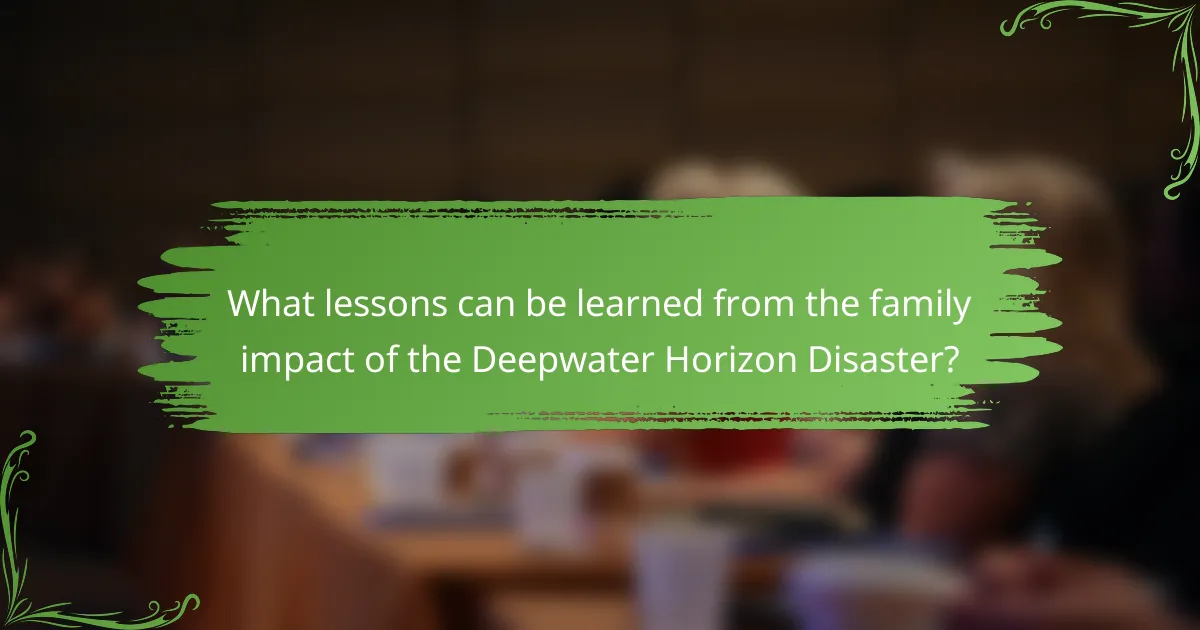
What lessons can be learned from the family impact of the Deepwater Horizon Disaster?
The family impact of the Deepwater Horizon Disaster highlights several important lessons. Families experienced significant emotional distress due to loss of income and livelihood. Many family members faced anxiety and depression as a result of the disaster. The disruption of community ties led to social isolation for affected families. Effective communication proved crucial in addressing concerns and providing support. Access to mental health resources was essential for coping with the trauma. Long-term recovery plans must consider the holistic needs of families. The importance of community resilience became evident in the aftermath. These lessons underscore the need for comprehensive disaster response strategies that prioritize family well-being.
How can future disaster responses better support affected families?
Future disaster responses can better support affected families by enhancing communication and providing tailored resources. Effective communication ensures families receive timely updates and information about available assistance. Tailored resources address specific needs, such as mental health services and financial support. Research indicates that personalized assistance improves recovery outcomes for families in crisis. For instance, the National Institute of Mental Health highlights the importance of mental health support following disasters. Additionally, community engagement fosters trust and collaboration between responders and families. Engaging local organizations can help identify unique family needs more effectively. These strategies collectively enhance the overall support provided to families during disasters.
What best practices can be implemented to aid families in crisis situations?
Establishing clear communication is essential to aid families in crisis situations. Providing timely and accurate information helps reduce anxiety. Offering emotional support through counseling services can help families process their feelings. Coordinating assistance with local organizations can ensure families receive necessary resources. Creating a safe space for families to express their concerns fosters trust and openness. Implementing regular check-ins can help monitor family well-being over time. Providing access to financial assistance can alleviate immediate stressors. These practices have been shown to improve family resilience during crises, as evidenced by studies on disaster recovery.
What practical steps can families take to cope with such tragedies?
Families can engage in open communication to cope with tragedies. Discussing feelings helps in processing grief. Seeking professional counseling provides additional support. Participating in support groups fosters connection with others facing similar challenges. Establishing routines can create a sense of normalcy amidst chaos. Engaging in physical activities promotes mental well-being. Creating memorials honors lost loved ones and aids in healing. Utilizing community resources can offer practical assistance and emotional support.
The main entity of this article is the family impact of the Deepwater Horizon disaster. The article outlines the emotional, financial, and health-related consequences faced by families affected by the disaster, including grief, anxiety, and financial instability due to job losses. It details the long-term effects on victims’ families, such as ongoing mental health struggles and the challenges of navigating legal and financial systems. Additionally, the article highlights available support systems, the role of media coverage, and lessons learned to improve future disaster responses for families in crisis.
